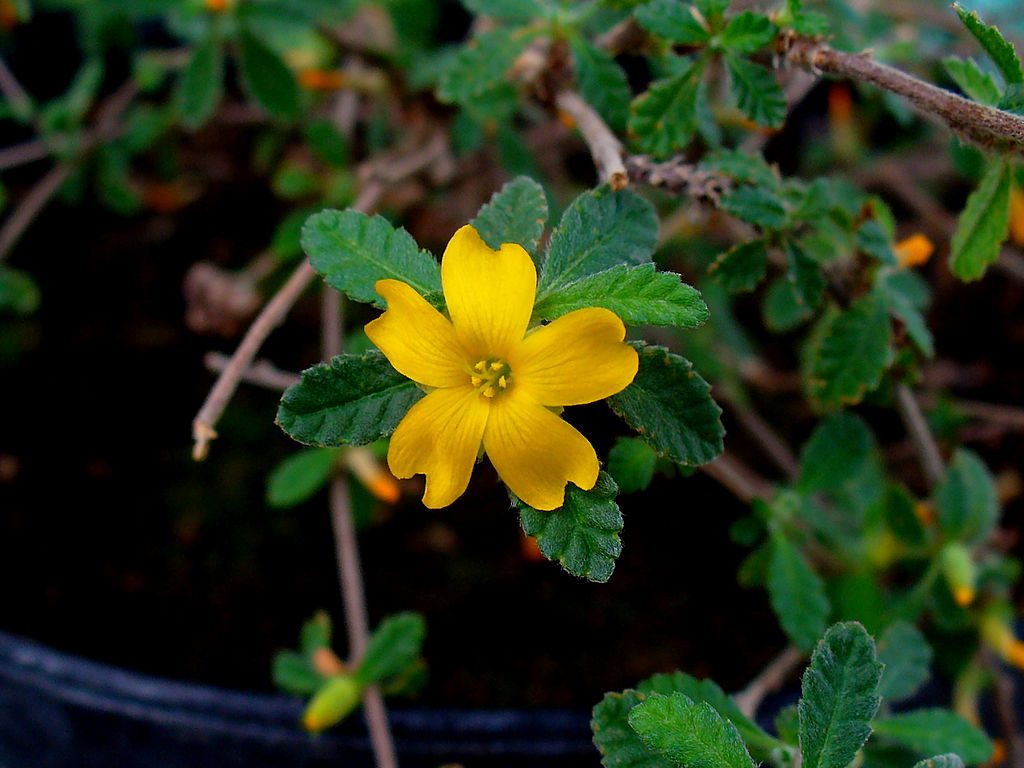 Damiana (Turnera diffusa) is a small woody shrub that is native to southern parts of North America, Central and South America. Damiana belongs to the Passifloraceae (passion flower) family of flowering plants, that also contains the passion flower plant. Damiana produces distinctive yellow flowers and fig-like fruits and has a woody structure. The essential oil within damiana have been reported to resembles that of chamomile. The leaves of the damiana plant are used in Traditional Central and South American medicine for their mood elevating properties. Passion flower has been well researched for its mood elevating effects, and it should be therefore no surprise that damiana, belonging to the same family of plant, possess similar properties. These mood elevating effects may include anxiolytic effects. In animal experiments, the anxiolytic effects of methanol extracts of damiana leaves have been reported to be comparable to the effects seen for the anxiolytic and sedative benzodiazepine drug, diazepam.
Damiana (Turnera diffusa) is a small woody shrub that is native to southern parts of North America, Central and South America. Damiana belongs to the Passifloraceae (passion flower) family of flowering plants, that also contains the passion flower plant. Damiana produces distinctive yellow flowers and fig-like fruits and has a woody structure. The essential oil within damiana have been reported to resembles that of chamomile. The leaves of the damiana plant are used in Traditional Central and South American medicine for their mood elevating properties. Passion flower has been well researched for its mood elevating effects, and it should be therefore no surprise that damiana, belonging to the same family of plant, possess similar properties. These mood elevating effects may include anxiolytic effects. In animal experiments, the anxiolytic effects of methanol extracts of damiana leaves have been reported to be comparable to the effects seen for the anxiolytic and sedative benzodiazepine drug, diazepam.

The main candidates for the anxiolytic effects of damiana (Turnera diffusa) are the flavonoids it contains. However damiana also contains a number of other phytochemicals that have been isolated and characterised, and may possess calmative properties. Damiana contains a number of phenolic acids and their derivatives including ellagic acid. Ellagic acid is found in strawberries and walnuts and is reported to have strong antioxidant effects. Extracts of damiana are therefore rich in antioxidants, and this may confer antioxidant protection to the neurones to those who consume the herb. This general antioxidant effect provided by flavonoids, phenolic acids and other components, may contribute to the mood elevating effects of the herb. Damiana also contains an essential oil. A number of components of this oil have been isolated and it has been shown to be composed mainly of a class of phytochemicals called terpenes, which are commonly found in the essential oils of plants. Of these the monoterpene compound thymol has been detected. Thymol has been shown to possess anxiolytic effects in animals models of anxiety. However, it cannot be discounted that other structurally similar terpenes also possess similar anxiolytic effects. Other compounds in damiana extracts include alkaloids, plant sterols and saponins, some of which may have antistress effects in humans and animals. Image from: By H. Zell (Own work) [GFDL (http://www.gnu.org/copyleft/fdl.html) or CC BY-SA 3.0 (http://creativecommons.org/ licenses/by-sa/3.0)], via Wikimedia Commons.
Chemical analysis of damiana plant components reveals that extracts of the plant contain the flavonoid apigenin. Apigenin is found in damiana in its sugar bound (glycosidic) form, with concentrations being dependent on the season of collection. Apigenin is a flavonoid belonging to the flavone group of flavonoids. Apigenin has been shown to bind to the benzodiazepine receptor in humans and animals, where it can induce relaxation and sedation, and has anxiolytic and calmative effects. Apigenin is also present in other herbs that have been noted to have calimite effects, most notably, chamomile. In addition to apigenin, damiana also contains the flavones luteolin, chrysoeriol, velutin and diosmetin. Flavones as a group have been shown to interact with the benzodiazepine receptor, and it so it is possible that these compounds also contribute to the anxiolytic effects of damiana. The flavonoid quercetin, belonging to the flavonol subgroup, is also present in damiana, and has also been shown to bind to the benzodiazepine receptor.
Eat Well, Stay Healthy, Protect Yourself
RdB
